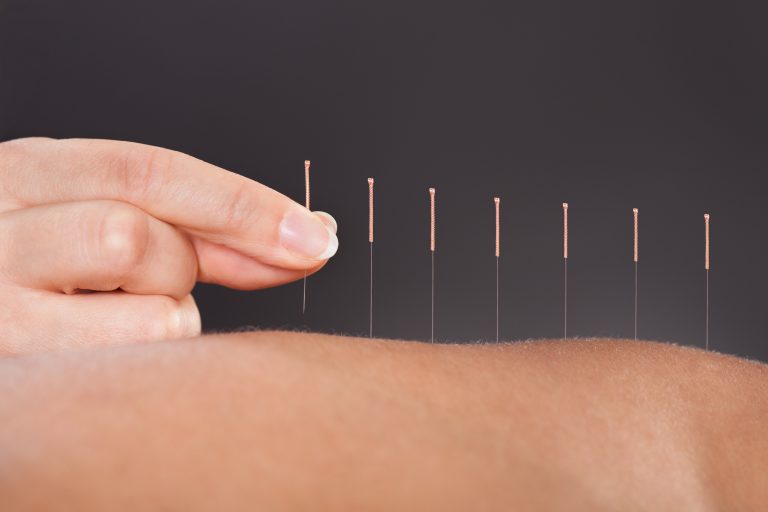How to Help New Patients Feel Comfortable During Acupuncture Treatment
As a second-year student at VUIM, I was working as a mid-level intern in the school clinic. One late afternoon, the front desk staff came into the intern room to find me and said, “Renée, we have a woman who thinks she has an appointment, but she isn’t on our calendar. Can you squeeze her into your day? She drove 45 minutes to come here.”
After receiving approval from my supervisor, I grabbed the chart and headed into the room. I was certain that a patient who had driven such a distance to receive acupuncture must be a fan of acupuncture!
After I greeted the patient and asked about her chief complaint, I quickly found out that the situation was different from what I expected. The patient had never received acupuncture. She had heard about acupuncture and its benefits, and a Google search led her to the student clinic at VUIM. She was dealing with a complex combination of chronic pain, high blood pressure, a difficult relationship situation, a challenging job, and doctors telling her she needed to do something to help herself become healthier.
As the intake continued, I observed that her legs would not stop bouncing out of nerves, she could not answer hard questions without laughing at the answers, and she needed to receive treatment while sitting in a chair instead of laying on a treatment table. This was a complex case. Before I stepped out to brief the supervisor, she asked, “Is this going to hurt?”
This is a question students are taught how to answer in the classroom, but it is not until we step into the clinic that we truly understand the power of our answer. I knew in this instance that only answering “Yes,” “No,” or “Sometimes,” would not be sufficient to build trust with the patient, and trust is critical for new patients to feel comfortable in acupuncture appointments.
Our training in school is heavily focused on the mechanics of acupuncture: where are the points, how do we safely reach the points while avoiding important body structures, what are the contraindications for acupuncture points, and how do we determine the best points to use for each individual patient. While all of this information is vital to the modality of acupuncture, we could not do our job without having the trust of the patient.
Instead of stepping out to grab my supervisor to review my treatment plan, I paused. I grabbed a package of needles and opened them. I showed her the thinness of the needles and how they bend while still being incredibly strong so that they do not break. I explained how the channels of the body all interconnect and the points along those channels have different functions. I guaranteed her that I would be letting her know everything I was going to do before I did it. I promised her that nothing would be done without her consent. I assured her that I could provide the whole treatment with her sitting in the chair. By giving time, compassion, and honesty, I gained her trust so that I could establish a long-term relationship with her.
We are taught in school that many acupuncture patients come to try acupuncture after visiting many other doctors who were not able to help them feel better. These patients are especially tired of the medical community. They are losing hope at feeling better, and they often carry many doubts about new treatments. The best way to help patients overcome their fears and doubts about acupuncture is to be honest, understanding, and compassionate. By remembering to focus on the Spirit, Mind, and Body, practitioners can earn patients’ trust. Here are a few areas to focus on:

Things to Keep in Mind to Help Patients Feel More Comfortable
Spirit Related
First and foremost, remember that the patient is the utmost authority about his or her body. When you ask questions, pay attention to the answers given by the patient. Your goal as a provider is to honor the intention of treatment that the patient has so that the patient’s spirit carries him/her through the difficulties of feeling poorly. When you are working with a patient, always avoid shaming, blaming, or demanding behaviors from patients. Instead, work on forming a partnership with the patient to encourage compliance. Feeling better and healing are sometimes hard work, so building up a patient’s spirit through empowerment and encouragement is extremely critical.
Mind Related
Narrate, Narrate, Narrate! As a provider you know what you are going to do and why, but the patient does not. Tell the patient what you are going to do and ask permission before you do it. A nervous patient’s mind can spin in anxiety while you are silently performing the treatment. However, if you narrate what you are going to do, and ask for permission, then the patient’s mind is more likely to stay at ease in the present moment with you.

Body Related
Remember to stay focused on the patient’s main complaint. If the main complaint for a patient is a sore back, then you need to show the patient that you are actively listening, addressing the issue, and treating it. Trust will only be acquired if you listen.
Additionally, it is helpful to check in with the patient regularly during treatment by asking questions such as “How are you feeling?”, “Is this painful?“, “How does this area feel now?” This encourages the patient to work with you during the treatment to gain trust.
As students, we spend countless hours reading, memorizing, and testing ourselves about the fundamentals of giving acupuncture treatments. We learn how to diagnose in the language of Traditional Chinese Medicine while also speaking the language of Western Medicine. We pride ourselves in seeing the whole body in a combination of Eastern and Western, yin and yang, and mind/body/spirit. In all of our hard work, it is very easy to forget that the reason we do all of this is to help the vulnerable person sitting in front of us.
The patient who sat in front of me feeling sick and scared trusted me more after I took the time to answer her question with honesty, patience, and compassion. She experienced the benefits of acupuncture and later became a regular patient, who eventually referred her friends and family to our school clinic.
About The Author

Renée Lee
Renée earned a Bachelor of Arts in Speech Communication at Texas A&M, a Masters of Arts in Communication from the University of Oklahoma, and a Masters of Science in Acupuncture from VUIM. Currently, she is working to complete her Professional Doctorate in Acupuncture, also at VUIM, while starting a new acupuncture and auricular medicine clinic in Reston. Personal and family health scares were what led Renée to the world of acupuncture. In her spare time to relax, she and her family are restoring a 2001 17ft Wide Body Burro Camper.
For more of her writing, please visit her website: www.feelingbettertogether.com
